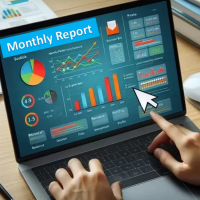Choosing the right business intelligence (BI) consultancy is critical for your business’s success. A skilled BI consultant can help transform your data into actionable insights, allowing you to make informed decisions. Here’s how to select the best consultancy for your needs.
1. Assess Your Business Needs
Before you start looking for a BI consultancy, clearly define your business objectives. Are you looking to improve data analytics, enhance reporting capabilities, or develop a comprehensive BI strategy? Understanding your specific needs will help you find a consultancy that specializes in the right areas.

2. Research Potential Consultancies
Conduct thorough research to compile a list of potential BI consultancies. Look for firms with a strong reputation and proven track record in the industry. Check their client testimonials, case studies, and any industry awards or recognitions they may have received.
3. Evaluate Their Expertise
Not all BI consultancies are created equal. Evaluate their expertise in the specific BI tools and technologies you are interested in, such as Tableau, Power BI, or Qlik. Ensure they have certified professionals and a deep understanding of these platforms.
4. Consider Industry Experience
Industry-specific experience can be a significant advantage. A consultancy that understands the unique challenges and regulatory requirements of your industry will be better equipped to provide relevant insights and solutions. Ask about their experience in your sector and request case studies that demonstrate their expertise.

5. Check Their Methodology
Understanding the consultancy’s approach and methodology is crucial. They should have a structured process for assessing your current systems, identifying gaps, and implementing solutions. This ensures that their work aligns with your business goals and provides measurable results.
6. Evaluate Communication Skills
Effective communication is essential for a successful partnership. The consultancy should be able to explain complex technical concepts in simple terms and keep you updated on the progress of your project. Good communication helps in setting clear expectations and achieving your BI goals efficiently.
7. Assess Flexibility and Scalability
Your BI needs may evolve over time, so it’s important to choose a consultancy that can scale their services to match your growing requirements. They should offer flexible solutions that can be tailored to your business as it grows and changes.
8. Consider Post-Implementation Support
A reliable BI consultancy will offer ongoing support after the initial implementation. This can include training for your staff, troubleshooting, and regular updates to ensure your BI system remains effective. Evaluate their support options and response times to ensure you have the assistance you need when issues arise.
9. Compare Costs
While cost shouldn’t be the sole factor in your decision, it’s important to consider your budget. Request detailed proposals from shortlisted consultancies and compare their pricing structures. Make sure you understand what is included in their fees and whether there are any additional costs.
10. Seek Recommendations
Finally, seek recommendations from your professional network. Colleagues and industry peers who have worked with BI consultancies can provide valuable insights and help you avoid potential pitfalls.
Conclusion
Choosing the right BI consultancy involves careful consideration of your business needs, thorough research, and evaluating the expertise and methodologies of potential partners. By following these steps, you can find a consultancy that will help you leverage your data effectively and drive your business forward.
We’ve helped dozens of teams streamline reporting and decision-making.
Explore our BI Services or book a call to talk through your goals.

